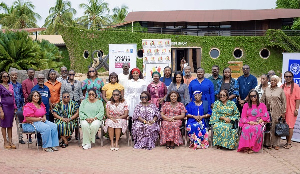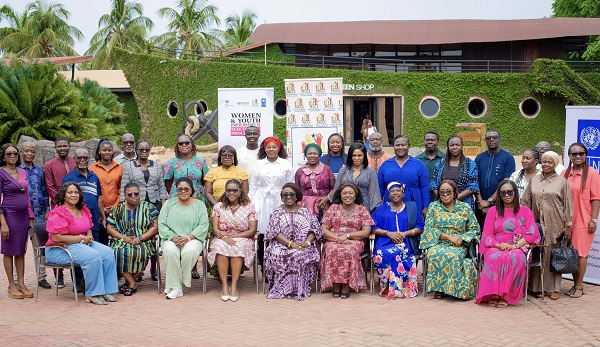 Group photo of female MPs in Ghana with representatives from partner organisations and consultants
Group photo of female MPs in Ghana with representatives from partner organisations and consultants
The United Nations Development Programme (UNDP) Ghana, in collaboration with the National Commission for Civic Education (NCCE), the Parliament of Ghana, with funding from the UK Government’s Foreign, Commonwealth and Development Office (FCDO) in Ghana, have successfully implemented a two-day capacity-building workshop for female Members of Parliament.
The workshop was aimed to strengthen the leadership, policy advocacy, and civic engagement skills of female parliamentarians, particularly first-time MPs, following the passage of the Affirmative Action Act, 2024.
Currently, women represent only 14.5% of Ghana’s Parliament (40 out of 276 seats), underscoring the importance of targeted support.
The workshop provided a platform for female MPs to gain knowledge and skills to effectively champion the women’s agenda in Parliament.
Addressing delegates during the workshop, Kathleen Addy, Chairperson of the NCCE, emphasized the importance of empowering female legislators:
“As a civic education institution, the NCCE is proud to support efforts that strengthen the voice and capacity of women in Ghana’s Parliament. Empowering female legislators with knowledge of the Affirmative Action Act and advocacy skills is key to deepening our democracy and ensuring governance reflects the needs of all citizens. We remain committed to promoting inclusive participation and constitutional governance, and we hope this workshop empowers the Women’s Caucus to actively champion the women’s agenda in Parliament.”
Edward Ampratwum, Head of Inclusive Growth and Accountable Governance, underscored the UNDP’s commitment to gender equality, “At UNDP, gender equality isn’t just a priority, it’s a commitment. We believe democracy cannot thrive without the full and equal participation of women. This workshop goes beyond capacity building; it’s about investing in a future where women are recognized as equal partners in shaping the policies that affect us all. Empowering female parliamentarians to lead, legislate, and influence is essential to achieving inclusive, sustainable development and leaving no one behind.”
Clara Osei Boateng, Governance Advisor at FCDO, added: “The UK Government is proud to support efforts that promote gender equality and inclusive governance. This workshop shows what’s possible when we work together to give women the tools they need to lead with confidence. Supporting female MPs goes beyond representation, it’s about improving lives in communities across Ghana.”
The workshop covered key provisions of the Affirmative Action Act, gender-sensitive budgeting, and strategies for policy advocacy with participants engaging in case studies and exploring digital tools for civic engagement.
Hon. Dr. Agnes Naa Momo Lartey, Minister for Gender, Children & Social Protection and MP for Krowor, shared her takeaway, “We are grateful to all partners for making this workshop possible, and I thank my fellow MPs for making time to participate. It has been truly impactful, especially for those who were unaware that the Affirmative Action Bill has now been passed. Beyond learning its content, we’ve gained clarity on the next steps for implementation. Now that we are all informed, we can move forward as a united front, sharing ideas and working to ensure the Act delivers real benefits for women and all Ghanaians.”
Hon. Mavis Nkansah Boadu, MP for Afigya Sekyere East, added: “As someone who entered Parliament at a young age, I know the value of mentorship, knowledge-sharing, and having a seat at the table. This workshop has reignited my passion for gender equity in governance. Learning about gender-responsive budgeting and using digital tools for advocacy has been eye-opening. These are practical strategies we can take back to Parliament to help shape policies that truly reflect the needs of women, children, and families. I’m committed to applying these lessons to push for inclusive development that leaves no one behind.”
This collaborative effort marks a critical step toward inclusive governance, where empowered female leaders can shape policies that reflect the needs of all Ghanaians. By investing in the leadership potential of women in Parliament, UNDP and partners are strengthening the foundation for more inclusive and equitable national development.


